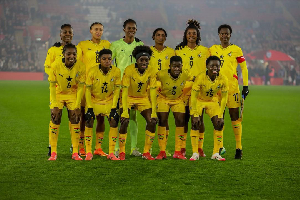The seemingly unending controversy surrounding the bribery scandal involving the former first family and the Norwegian cement giant, Scancem, keeps gaining some interesting twists and turns by the day, as various people from all walks of life continue to join the ongoing debate as to whether or not the allegations leveled against Mr. and Mrs. Rawlings were true.
Latest on the list of debators is a one-time crony of the ex-President and a major architect of the June 4 uprising, Osahene Boakye Djan, who has challenged the former first family to march to the courts to prove their innocence in the matter.
“They should stop hopping from radio station to station; if Rawlings thinks he is a paragon or a saint then the best way to continue his saintly posture is to go to court and then we will all see who is telling the truth; if he doesn’t then it’s a clear evidence that he is guilty”, he challenged.
He told The Crusading GUIDE in an interview that Mr. Rawlings, in a similar incident, paraded before court and jailed Mr. Okutwer Bekoe, Krobo Adusei and Kwesi Armah for contracting a private loan of $1 million which was meant to re-settle the Armed Forces Revolutionary Council (AFRC) members, including himself (Rawlings), after they (AFRC) handed over to a civilian government in 1979.
According to him, after Mr. Rawlings was forcibly retired from the Army due to his demeanor and his alleged involvement in a jail break, it became necessary to deal with the issue of how to resettle him.
This, Osahene said, was the main reason why the politicians contacted a South African Business Magnate to contract the said loan.
Although not proven, Osahene alleged that $200,000 out of the loan which was meant to convert the former President from a military pilot to a civilian pilot was deposited in an Italian bank account to facilitate the process.
Part of the money he alleged, was used in purchasing a Peugeot 504 and a house at Kaneshie for Mr. Rawlings.
Asked how he arrived at this conclusion, he answered that he was told by the three politicians – Okutwer Bekoe, Krobo Adusei and Kwesi Armah – who came to him in London to discuss a similar deal with him.
“I obviously did not agree because I was still a serving officer and there was no way I could be resettled”, he continued.
The AFRC spokesman, who was also accused of receiving $100,000 from the loan, argued that it was totally wrong for the politicians to be jailed for contracting a private loan adding that “it was not a kick back or official government loan, yet they were charged with corruption”.
He therefore challenged Mr. Rawlings to go through the same court process in dealing with the matter at hand to clear his name.
Giving a brief overview of why the loan was contracted and other related matters, Osahene Boakye Djan, the author of the controversial book on the profile of the AFRC, entitled “CALL TO DUTY”, said after they (AFRC members) handed over power, they were given three options; “one was to go on extended leave and never to come back into the armed forces, second was to go on extended leave and come back and third was to go on a long course abroad and come back”.
According to the retired army officer, majority of the AFRC men chose to go abroad for the simple reason that their presence in the country was going to create command problems for the re-organization of the Army.
He stated that Mr. Rawlings was the only one who chose never to avail himself of any of the three options, adding that “he started behaving as if things were normal”.
He recollected an episode where Rawlings’ action threw the whole Castle into a state of pandemonium after he (Rawlings) mounted a guard at the Castle when then President Hilla Limman, was receiving an Ambassador.
This according to him, was the main reason why Rawlings was forcibly retired from the army and the reason why the loan was contracted.
Osahene contended that although the politicians – Okutwer Bekoe, Krobo Adusei and Kwesi Armah – alleged that they had given some of the money to some AFRC members, they were not prevailed upon by the court to mention names.
General News of Thursday, 16 August 2007
Source: Crusading GUIDE












